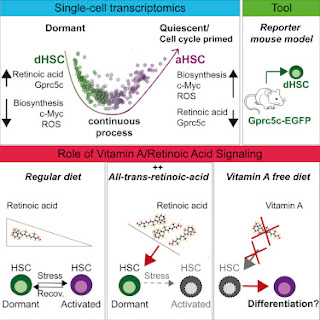A study done at the German Cancer Research Center has found that a vitamin A deficiency can negatively impact
blood stem cells. Specialized cells located in the blood, digestive system, and skin have a relatively brief
lifespan and require regular replenishment. They come from stem cells which constantly divide in order to
survive.
In 2008, scientists found a group of specialized stem cells which are located in the bone marrow that are
dormant the majority of the time, and only become active in order to combat viral or bacterial infections,
loss of blood, or in reaction to chemotherapy treatments. When their task is completed, these powerful stem
cells return to a dormant state.
The mechanisms that case the stem cells to activate and deactivate have now been identified. It was discovered
that retinoic acid, which is a vitamin A metabolite, is critical for these processes. When retinoic acid isn't
present, active stem cells aren't able to go back into dormancy and they develop into specialized blood cells,
instead.
Using specially-bred mice, researchers learned that the stem cells are lost as a reservoir if there is a
shortage of retinoic acid. "If we feed these mice on a vitamin A deficient diet for some time, this leads to a
loss of stem cells," Nina Cabezas-Wallscheid, lead author of this study, stated. "We can prove for the first
time that vitamin A has a direct impact on blood stem cells."
This research serves to help provide new insight into previous studies which indicated that vitamin A
deficiency impairs the immune system. "This shows how vitally important it is to have a sufficient intake of
vitamin A from a balanced diet," Cabezas-Wallscheid said.
Researchers speculate that these findings may play a role in future cancer treatments because cancer cells,
like stem cells, rest in a dormant state and their metabolism is stopped, resulting in resistance to
chemotherapy.
Study pulished in Cell.

No comments:
Post a Comment